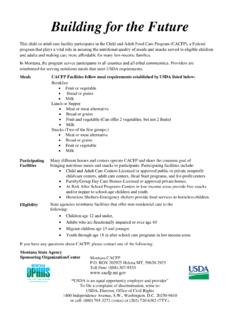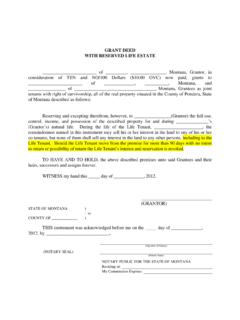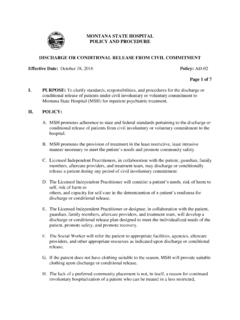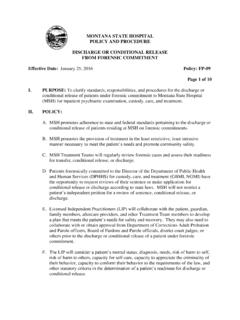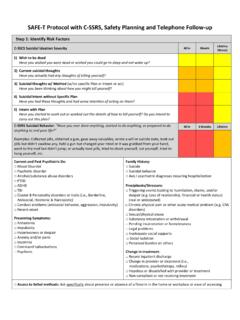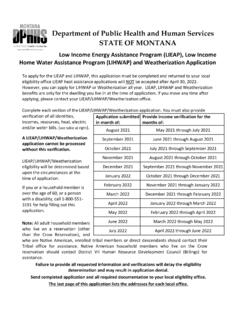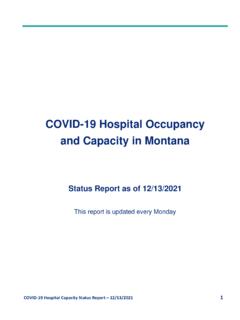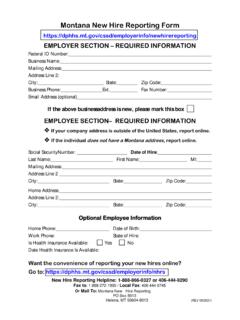Transcription of Dysphagia and Diets
1 Health and Safety Guidelines Dysphagia 1 2018, 12-10 JJustad, MD DDP Dysphagia and Diets Problems with swallowing can occur at any time and may not be known to that person or caregivers. It is important to be aware of swallowing difficulties due to the high occurrence of choking and aspiration associated with them. There are clues that can help identify when someone is having swallowing difficulties, however, many people can also have what is known as silent aspiration . Many factors can compromise someone s ability to swallow safely. These are outlined below. Aging may be enough to compromise someone s swallowing abilities but the addition of medications may make this much worse. Medications such as those used for allergies or urinary incontinence cause a dry mouth making swallowing more difficult.
2 Antipsychotic medications can cause both a dry mouth and affect the muscles of the face and tongue which are involved in swallowing. Medications that depress the central nervous system can decrease awareness and voluntary muscle control that may affect swallowing. These include medications used to treat seizures, antianxiety drugs, narcotics and muscle relaxants. The following information may seem very technical at times but it is important for understanding all the problems that can occur. This paper includes information regarding Diets that may be ordered by a swallowing specialist or medical provider or that should be considered based on a person s age, medications, medical problems, and physical abilities even if that person hasn t had a formal swallowing evaluation.
3 Dysphagia Dysphagia (dis-f jah) is the sensation of having difficulty or an abnormality of swallowing. It can simply be due to eating too fast or not chewing food well enough. There are two types of Dysphagia : 1. Oropharyngeal Dysphagia involves the pharynx (the area behind the mouth and nasal cavity and above the esophagus) and upper esophagus (the tube that leads from the mouth to the stomach). Problems associated with this include: difficulty starting a swallow liquid coming through the nose (nasopharyngeal regurgitation) aspiration sensation of food still in the pharynx 2. Esophageal Dysphagia is caused by an abnormality of the esophagus. It is often characterized by a sensation of food getting stuck.
4 Swallowing Swallowing involves more than 30 muscles, so timing and coordination are crucial. It takes your brain, along with several nerves, muscles, two muscular valves, and an open esophagus to work just right. There are three phases of swallowing: 1. First phase - oral preparatory phase where food is chewed into a size, shape and consistency that can be swallowed. The tongue is critical in controlling the food for chewing and for moving the food into the proper position for swallowing which is at the back of the tongue. Health and Safety Guidelines Dysphagia 2 2018, 12-10 JJustad, MD DDP 2. Second phase - pharyngeal phase Food is advanced through the pharynx (behind the mouth; the throat) and into the esophagus During this phase muscles move the larynx (the area below the root of the tongue and above the trachea which contains the vocal cords) upward and forward to close the airway (trachea) and protect from aspiration.
5 Normal muscle and nerve coordination must occur for this to work 3. Third phase - esophageal phase: Coordinated contractions of muscles (peristalsis) in the esophagus along with relaxation of the lower esophageal sphincter moves food into the stomach Causes o f oropharyngeal Dysphagia : 1. Disorders of oral preparatory phase: Inadequate chewing due to tooth problems Decrease is saliva (dry mouth) o Diseases such as Sjogren s syndrome, parkinson s disease o Strokes o Sores or lesions in the mouth o Radiation of head or neck o Medications including: Some blood pressure medications Antihistamines used to treat allergies Decongestants used to treat respiratory infections, colds Anticholinergics such as medications used to treat urinary incontinence Diuretics used to rid the body of excess fluid Selective serotonin reuptake inhibitors (SSRIs), antidepressants such as Prozac, Celexa, Zoloft.
6 Congenital disease such as cleft palate 2. Disorders of pharyngeal phase Neurological disorders o Stroke, head trauma o Dementia o Cerebral palsy o Multiple sclerosis o Tardive dyskinesia o Muscular dystrophy o parkinson s disease Obstruction o Tumor or swelling o Esophageal rings or webs o Skeletal abnormalities Health and Safety Guidelines Dysphagia 3 2018, 12-10 JJustad, MD DDP 3. Antipsychotic medications Many produce dry mouth but some also cause movement disorders that impact the muscles of the face and tongue Include Clozaril, Haldol, Zyprexa, Seroquel, Risperdal, etc. 4. Medications that depress the central nervous system These decrease awareness and voluntary muscle control and thus may affect swallowing Antiepileptic drugs for seizures o Carbamazepine, gabapentin, phenobarbital, phenytoin, valproic acid Benzodiazepines (antianxiety drugs) o Clonazepam, diazepam, lorazepam, etc.
7 Narcotics for pain o Codeine, fentanyl, hydrocodone, oxycodone Skeletal muscle relaxants o Baclofen, cyclobenzaprine, tizanidine Saliva: Why is saliva so important? Here are some key facts about saliva: 1. The digestive process begins with saliva because it contains many enzymes such as amylase. 2. Saliva enhances the taste of food. 3. Saliva provides lubrication which is needed for swallowing more easily and for helping with speaking. 4. Saliva has some anti-viral, anti-bacterial, and anti-fungal properties. 5. Saliva cleanses the mouth by removing bacteria, plaque, and microorganisms when swallowing. The higher the rate of saliva flow, the better the cleansing action. 6.
8 Saliva p rotects and repairs mouth mucosa. 7. Saliva helps prevent cavities unless it becomes too acidic. If saliva is too acidic, it can harm tooth enamel and cause decay. This can occur when people drink a lot of water with lemon or lime in it or other acidic drinks. Having reflux can also increase the acidity of the mouth and harm teeth from stomach acid. Symptoms of Dysphagia : The symptoms that can be seen when someone is having problems swallowing and possibly aspirating include: Not being able to swallow or choking on food Pain while swallowing or feeling like food is stuck in the throat or chest Coughing or gagging while swallowing Drooling Trouble speaking Aspiration and frequent pneumonia from food or fluids going into the lungs Health and Safety Guidelines Dysphagia 4 2018, 12-10 JJustad, MD DDP Evaluation: A swallowing study is one of the tests used to evaluate problems with swallowing.
9 Videoflouroscopy with a modified barium swallow is used to visualize swallowing and diagnose oropharyngeal Dysphagia . Videoflouroscopy is an x-ray that is videotaped while someone is swallowing food or fluid that contains barium. Management: The goals of management are to improve food transfer and prevent aspiration. It involves treating the underlying disorder and may involve surgery. It may also involve rehabilitation of swallowing which is often needed after someone has a stroke. Positioning and environment are important to consider while eating: Sit upright at a 90-degree angle Remain upright for at least 15 to 20 minutes after eating Minimize distractions while eating Refrain from talking when food is in the mouth Eat slowly and chew thoroughly Dietary modifications: Dietary modifications are often needed to improve swallowing and avoid aspiration.
10 These include: Special Diets such as pureed foods or thicker liquids. Smaller bites Alternating solids and liquids Using particular implements such as a cup, straw, or spoon Thick liquids: Thick liquids are often prescribed for individuals with swallowing disorders. Thickening liquids can impact the amount of liquid intake and may result in dehydration if the individual is not able to take in adequate amounts. Thickeners can also alter the taste of the fluid causing individuals to refuse to drink it. Thickeners can also be very constipating. Some of the reasons for ordering liquids to be thickened include: Thin liquids move fast and can spill out of the mouth and into the throat before the individual is ready to swallow.
